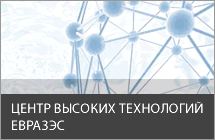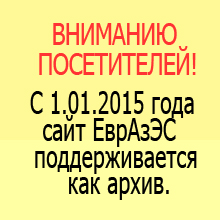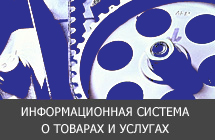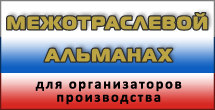|
REGULATIONS on the Secretariat of the Inter-parliamentary Assembly of the Eurasian Economic Community APPROVED by Resolution of the EurAsEC Inter-parliamentary Assembly Bureau 15 November 2006, No. 8
REGULATIONS on the Secretariat of the Inter-parliamentary Assembly of the Eurasian Economic Community
I. GENERAL PROVISIONS
1. The Secretariat of the Inter-parliamentary Assembly of the Eurasian Economic Community (hereinafter referred to as the Secretariat and the Assembly) is established to provide support for the activity of the Assembly and the Assembly Bureau, as well as of standing and provisional committees and other subsidiary organs established by the Assembly with the purpose of enabling the Assembly to properly discharge its functions. The Secretariat is a permanent executive organ of the Assembly and the Assembly Bureau. 2. Work of the Secretariat is governed by the Treaty on the Establishment of the Eurasian Economic Community of October 10, 2000, as well as by Regulations on the Interparliamentary Assembly of the Eurasian Economic Community, Rules of the Interparliamentary Assembly of the Eurasian Economic Community, Resolutions of the Assembly and of the Assembly Bureau, Ordinances issued by Chairman of the Interparliamentary Assembly, legislative acts of the Russian Federation in the part pertaining to the relations between the Assembly and the receiving country, and by the present Regulations.
II. COMPOSITION AND STRUCTURE OF THE SECRETARIAT
1. The Secretariat consist of organizational departments (main departments, departments, divisions). Their competence (scope of activities) includes all areas of activity of the Assembly. A printing and publications department also forms part of the Secretariat structure. 2. The Executive Secretary is in control of the Secretariat’s work and is the chief executive officer of the Assembly. The Executive Secretary is appointed by the Assembly Bureau upon advice by the Chairman of the Interparliamentary Assembly. 3. By virtue of their position, parliamentary representatives in the Assembly are deputies to the Executive Secretary on questions pertaining to relations between the Assembly and respective parliaments, and shall discharge their functions in the Secretariat on a regular basis. 4. Organizational departments of the Secretariat recruit qualified employees and the work of the latter shall be regulated by labor agreements (contracts). 5. The structure of the Secretariat is defined by the Assembly Bureau upon advice of the Executive Secretary. 6.
The Executive Secretary, deputies to the Executive Secretary, par-liamentary
representatives, officers and employees of the Secretariat (except for
technical and service staff) are international civil servants and 7. Officers and employees of the Secretariat are appointed to and released from office by the Executive Secretary in accordance with the procedure specified by Regulations on the Officers of the Organs of the Eurasian Economic Community and by Regulations on the Employees of the Organs of the Eurasian Economic Community.
III. FUNCTIONS OF THE SECRETARIAT
Acting within their powers, the Secretariat of the Interparliamentary Assembly discharge the following functions: а) prepare papers for meetings of the Assembly and the Assembly Bureau, as well as for meetings of other organs; b) ensure implementation of resolutions issued by the Assembly and the Assembly Bureau, as well as of orders issued by the Chairman of the Interparliamentary Assembly; c) provide information, legal and organizational support for activities of the Assembly and the Assembly Bureau, as well as for activities of other organs; d) conduct clerical work and compile archive for the Assembly; e) ensure communication with parliaments of states – members of the Eurasian Economic Community and with parliaments of other states, as well as with international parliamentary organizations and other organizations; f) interact with representatives of mass media in respect of issues pertaining to coverage of activities of the Assembly and the Assembly Bureau, as well as of other organs; g) provide material and technical support for activities of the Assembly and the Assembly Bureau, as well as for activities of other organs. Secretariat interact with the Integration Committee of the Eurasian Economic Community on harmonization (reconciliation, unification) of national legislation, on the development of a legal framework for integration purposes, on legislation drafting, as well as on other issues.
IV. EXECUTIVE SECRETARY OF THE INTERPARLIAMENTARY ASSEMBLY
The Executive Secretary of the Interparliamentary Assembly: a) controls the Secretariat’s work and be responsible for the proper discharge of his functions; b) ensures implementation of resolutions by the Assembly and the Assembly Bureau, as well as of orders issued by the Chairman of the Interparliamentary Assembly; c) approves regulations on the organizational departments of the Secretariat and duty regulations for employees of the Secretariat; d) directs the work of organizational departments of the Secretariat; e) issues ordinances and decrees binding on all employees of the Secretariat; f) approves long-term and current work plans for the Secretariat; g) on behalf of the Assembly, exercises the right of a legal person, disposes of financial and real assets of the Assembly, enters into agreements and sign contracts including labor contracts, appears in court, issues powers of attorney; h) sets up settlement accounts, as well as other accounts at banks; i) submits to the Assembly Bureau for consideration a draft expense budget for the forthcoming year and a budget expenses control report for the preceding year; j) authorizes a staffing table for the Secretariat; k) within the scope of invested powers, interacts with organs of the Eurasian Economic Community, as well as with state and administrative organs of the Member States, and with international parliamentary and other organizations; l) discharges other functions in accordance with the present Regulations. V. RIGHTS, OBLIGATIONS AND RESPONSIBILITY OF OFFICERS AND EMPLOYEES OF THE SECRETARIAT
1. Officers and employees of the Secretariat have qualifications conforming to the qualifying requirements set for their offices and positions in order to properly discharge their duties. 2. Officers and employees of the Secretariat discharge their duties in accordance with documents regulating activities of the Interparliamentary Assembly and documents defining their duties. 3. Rights and obligations of officers and employees of the Secretariat are specified by duty regulations approved by Executive Secretary. 4. Officers and employees of the Secretariat are not involved in any trade or business or in any other activities acting in their own interests or in the interests of other persons. The exceptions are scientific, creative, and teaching activity. 5. Officers and employees of the Secretariat are held liable for failure to discharge or for improper discharge of their duties in accordance with Regulations on the Officers of the Organs of the Eurasian Economic Community and Regulations on the Employees of the Organs of the Eurasian Economic Community.
VI. STATUS AND SOCIAL PROTECTION OF OFFICERS AND EMPLOYEES
1. Status and social protection of officers and employees of the Secretariat are defined in accordance with the Convention on the Privileges and Immunities of the Eurasian Economic Community, Regulations on the Officers of the Organs of the Eurasian Economic Community, and Regulations on the Employees of the Organs of the Eurasian Economic Community. 2. Employees of the Secretariat have the same status, enjoy the same financial security and social protection, work in the same labor conditions, and receive the same social welfare as employees of equal positions at the Secretariat of the Integration Committee. 3. Officers and employees of the Secretariat receive retirement benefits and social welfare in accordance with the Convention on the Privileges and Immunities of the Eurasian Economic Community. VII. FINANCIAL AND ECONOMIC ACTIVITIES OF THE SECRETARIAT
1. The Secretariat is an independent accounting unit with current and settlement accounts (in rubles and in foreign currency), as well as with other accounts at banks, and with settled property. It has a seal with its full name and other prerequisites of an independent institution. The Secretariat is located in St. Petersburg, Russian Federation. 2. Real and financial assets of the Secretariat are on the Secretariat’s books and shall be used in accordance with the existing legislation of the Russian Federation. 3. Financing of the Secretariat’s activities are provided out of the budgetary funds of the Eurasian Economic Community made available for financing the Interparliamentary Assembly of the Eurasian Economic Community, in accordance with procedures specified by the Regulations on the Procedures for Budgeting and Implementation of Budget of the Eurasian Economic Community approved by the Interstate Council of the Eurasian Economic Community. 5. The Russian language is adopted as the working language of the Secretariat. 6. The Secretariat publishes a newsletter, as well as other printed matter to give coverage to practical experience in the sphere of integration and results thereof, and to print official acts of the Assembly. 7. Restructuring of the Secretariat is implemented by the Assembly Bureau, and its liquidation by the Interparliamentary Assembly, after consultation with the Interstate Council. __________
|
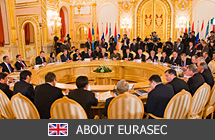
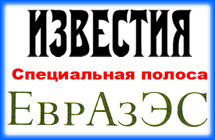
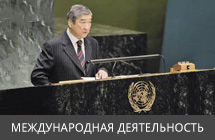
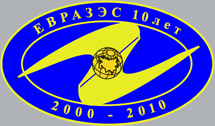
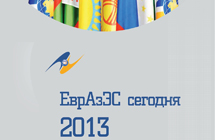
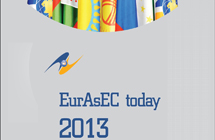
Поиск 10.10.2014 Заседание Межгосударственного совета ЕврАзЭС07.10.2014 Мультимедийная пресс-конференция в агентстве «Россия сегодня»03.10.2014 Встреча с Послом Финляндской Республики04.08.2014 Встреча Генерального секретаря ЕврАзЭС с Послом Республики Таджикистан20.06.2014 Премии Петербургского международного юридического форума «За вклад в развитие правовой интеграции на евразийском пространстве»28.05.2014 Договор о Евразийском экономическом союзе – важнейшее событие в новейшей истории наших стран25.05.2014 Презентация книги «Евразийский проект Нурсултана Назарбаева, воплощенный в жизнь. К 20-летию евразийского проекта 1994–2014»24.05.2014 VII АСТАНИНСКИЙ ЭКОНОМИЧЕСКИЙ ФОРУМ. Панельная сессия «Евразийской экономической интеграции – 20 лет. Итоги и перспективы»24.05.2014 VII Астанинский экономический форум и II Всемирная Антикризисная конференция, 21-23 мая 2014 года, Астана24.05.2014 Петербургский международный экономический форум, 23 – 24 мая 2014 года, Санкт-Петербург |

Евразийское экономическое сообщество
ЕврАзЭС
-
Страны участники
 Беларусь
Беларусь
-
 Казахстан
Казахстан
-
 Кыргызстан
Кыргызстан
-
 Россия
Россия
-
 Таджикистан
Таджикистан
-
 Узбекистан
Узбекистан
-
 Молдова
Молдова
-
 Украина
Украина

